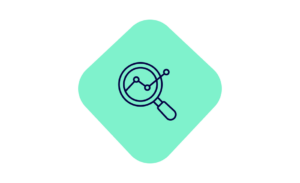
Practical laboratory for AI research and development
Artificial intelligence has great potential to support people with disabilities in working life. However, the previous KI.ASSIST project also made it clear that there are no suitable, applicable AI-based assistance technologies for some of the important support needs of people with disabilities.
In the AI Compass Inclusive project, we are therefore working with people with disabilities and AI researchers to research the untapped potential of AI for the professional participation of people with disabilities and are jointly developing concepts for prototypes of AI-supported assistance technologies.
What questions and goals do we pursue with the AI research and development practical laboratory?
We explore several important questions that are relevant to AI research and development aimed at enabling the professional participation of people with disabilities.
- What gaps can be identified between the support needs of people with disabilities and AI-supported assistance systems?
- What should concepts and prototypes of suitable AI-supported assistive technologies look like in order to meet the support needs of people with disabilities?
- How can prototypes of AI-supported assistance technologies be transferred from research into marketable AI assistance systems and how can this transfer be supported?
By pursuing these questions, we want to bring inclusion and professional participation into AI research and development. We also want to involve and bring together people with disabilities, AI researchers and other key players throughout the process in order to involve people with disabilities in the digital transformation and bring together the two “worlds” of professional inclusion or rehabilitation and artificial intelligence.
What do we do in the AI research and development practice laboratory?
In a first phase, we investigate what support needs people with different disabilities have. In doing so, we differentiate between disabilities or types of disabilities (e.g. visual impairments, hearing impairments, learning disabilities). In this phase, we also investigate which AI-supported assistance technologies already exist as market-ready products and as research projects on these support needs. The project’s technology monitor , among other things, provides information on this. We then hold several workshops with people with different disabilities and AI researchers to, among other things, evaluate the possibilities of AI for the support needs.
With the results, we identify important desiderata for AI research and development . These desiderata are the starting point for the development of concepts for prototypes of AI-supported assistance technologies.
Who do we want to work with in the practice laboratory?
In the practical laboratory, we would like to work primarily with people with disabilities and AI researchers. Other important actors could be vocational rehabilitation institutions and employers.
People with disabilities are experts in their own field. They know their environment, the barriers that arise in everyday life and their needs and requirements best. In our view, this experiential knowledge is very important as a starting point and in the process of researching and developing AI technologies.
AI researchers are AI experts and know the possibilities and limitations of AI for different use cases best. Because AI is a very large research and technology field, we would like to involve researchers from the various AI research fields (e.g. natural language processing, computer vision, etc. ) .
Rehabilitation facilities such as workshops for people with disabilities (WfbM), vocational training centers (BFW) or vocational training centers (BBW) prepare people with disabilities for work in the general labor market. They thus operate at the interface between people with disabilities and employers and have valuable knowledge for AI research and development.
AI technologies must also prove themselves when used in the labor market. If AI technologies are to be used in companies to support people with disabilities at work, these technologies must also meet economic requirements. It can therefore also make sense to involve employers.
Focus of the practical laboratory AI research and development
- Participation and collaboration with people with disabilities and AI researchers
- Investigation of the desiderata in AI research and development from the perspective of the professional participation of people with disabilities
- Development of concepts and design of prototypes of AI-supported assistance technologies for professional participation
Would you like to know more?
The contact person for the practical AI research and development laboratory is the German Research Center for Artificial Intelligence (DFKI) . The best way to reach us is by email: info@ki-kompass-inklusiv.de







